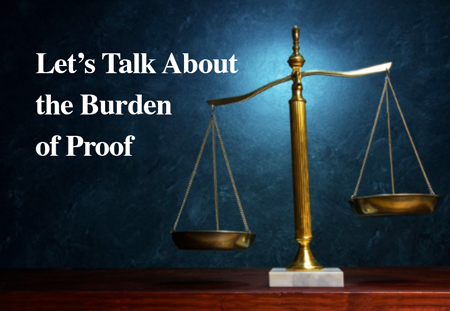 The burden of proof for the party claiming separate property, the value of tracing funds that acquired real property assets, and a determination of goodwill are very important elements in family law matters. The husband in this scenario was a successful pediatrician and the wife was a homemaker. During their marriage, the wife inherited a substantial amount of money from her mother’s estate. Fortunately, for her, she was the executrix of her mother’s will and kept very good records. During their marriage, they purchased several pieces of real property and used separate property funds as well as community property funds.
The burden of proof for the party claiming separate property, the value of tracing funds that acquired real property assets, and a determination of goodwill are very important elements in family law matters. The husband in this scenario was a successful pediatrician and the wife was a homemaker. During their marriage, the wife inherited a substantial amount of money from her mother’s estate. Fortunately, for her, she was the executrix of her mother’s will and kept very good records. During their marriage, they purchased several pieces of real property and used separate property funds as well as community property funds.
During the investigation and tracing of the funds used to purchase the properties, the wife provided all of the probate documents and all the bank statements and canceled checks for the separate property account. This enabled the preparation of a perfect tracing of her separate property. She had recognized the importance of maintaining good records of her separate property early on. In Texas, the Family Code requires the party claiming separate property ownership to prove the property was purchased with separate funds and to carry the burden of proof, which is clear and convincing evidence. Otherwise, the property is presumed to be community property. Ultimately, her forensic accountant and expert witness were able to demonstrate and prove to the court that her separate property funds were used to purchase the properties. The court ruled in her favor and she was awarded the real estate since each property was joint ownership.
With respect to the husband’s medical practice, the attorney for the wife had the practice valued thinking the value would only be the value of the business assets and personal (professional) goodwill and not the business (enterprise) goodwill. When the forensic accountant examined the practice, it was discovered the physician had four physician’s assistants who saw ninety percent of the patients and generated commensurate revenue. The revenue they generated was enterprise goodwill, which increased the business value from $50,000 personal professional goodwill to $500,000 for enterprise goodwill.
Goodwill in family law is the value of abusiness or professional practice above and beyond the value of the business or practice itself. The Internal Revenue Service defines goodwill as “the value of a trade or business based on expected continued customer patronage due to its name, reputation, or any other factor.” (IRS Publication 535: Business Expenses, Ch. 9, Cat. No. 15065Z). There are two types of goodwill: Personal (professional) goodwill, which attaches to the personal efforts of an individual and enterprise goodwill, which attaches to the business.
In many states, goodwill (or a portion thereof) has long been recognized as “property” in family law cases. Therefore, goodwill is subject to equitable distribution. Texas is a community property state, however, the family code requires that property be divided in a manner that is “right and just” and under the circumstances, the division of property must be equitable.
There is no better firm than Sage Investigations at “following separate property funds” with over 50+ years of experience following money. Sage uses proprietary software (DIO) to help develop the full picture of the financial aspects of your case to help structure your future or that of your client. Learn more about assisting you or your clients by contacting retired Internal Revenue Service Special Agent Edmond J. Martin, Chief Investigator at Sage Investigations, LLC. Email edmartin@sageinvestigations.com website: www.sageinvestigations.com or call 512-659-3179. Thanks to Kenneth Huff, CPA for his input on this article.
NOTE: Please be advised that Sage Investigations, LLC, Edmond J. Martin, CFE and Kenneth Huff, CPA are not attorneys and this article is not intended to provide legal advice.


 Call
Call